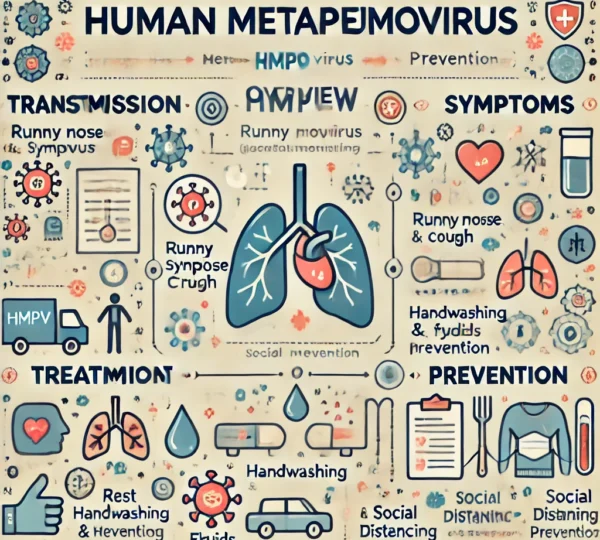This Common Respiratory Infection Could Be Affecting Your Child
Human Metapneumovirus (hMPV): Symptoms, Prevention, and Treatment
Introduction
Human metapneumovirus (hMPV) is a respiratory infection that commonly affects infants and children, though it can impact people of all ages. Part of the pneumovirus family, hMPV shares similarities with respiratory syncytial virus (RSV), making it challenging to differentiate between the two without medical testing.
How Does hMPV Spread?
hMPV spreads through respiratory droplets, which are released when an infected person coughs or sneezes. These droplets can enter the mouth or nose of people nearby or be inhaled, leading to infection. Since it spreads so easily, understanding prevention steps is essential.
Symptoms of hMPV Infection
Symptoms of hMPV infection resemble those of other respiratory infections, including RSV and the common cold. You might notice:
- Runny nose
- Cough
- Sore throat
- Fever
- Wheezing
- Difficulty breathing
Early recognition of symptoms, especially in children, can help you manage the infection effectively and reduce its severity.
Treatment for hMPV Infection
Currently, no specific treatment exists for hMPV infection. Most cases involve supportive care, including rest, hydration, and over-the-counter medications for symptom relief. If a secondary bacterial infection arises, doctors may prescribe antibiotics. For infants and young children, monitoring symptoms closely is especially important to prevent complications.
Preventing hMPV Infection
While there is no vaccine for hMPV, you can take steps to lower the risk of infection. Some preventive measures include:
- Washing hands frequently with soap and water
- Avoiding close contact with people who are visibly sick
- Covering your mouth and nose when coughing or sneezing
- Cleaning and disinfecting commonly touched surfaces and objects
These practices not only help prevent hMPV but also reduce the risk of other respiratory infections.
Comparing hMPV and RSV Symptoms
Both hMPV and RSV share similar symptoms, which makes it difficult to tell them apart based on symptoms alone. Medical testing may be needed to confirm which virus is causing the symptoms.
Conclusion
Although hMPV is a common respiratory virus, understanding how it spreads and recognizing early symptoms can help you manage the infection effectively. By taking preventive measures like frequent handwashing and minimizing exposure to sick individuals, you can lower your risk of infection. If you think you or your child may have hMPV, consult your doctor to discuss treatment options.
For more information on respiratory health and treatment guidelines, feel free to explore additional resources on our website.
For more information Click Here



